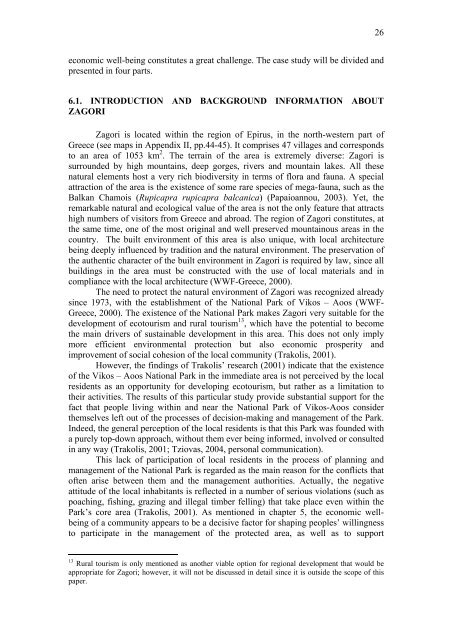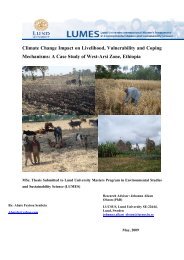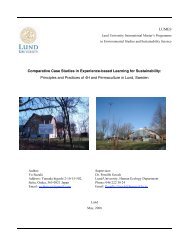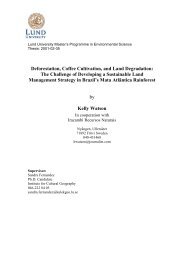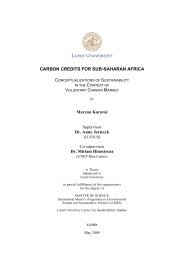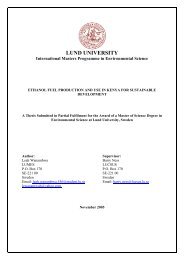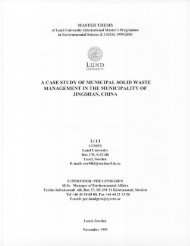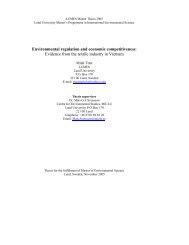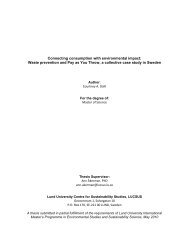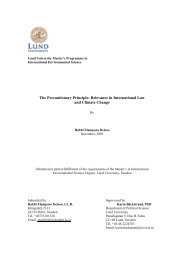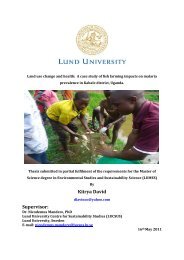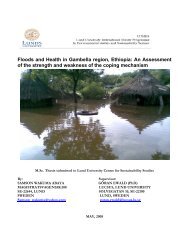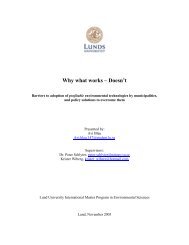Thesis title: âThe development of community-based ecotourism - lumes
Thesis title: âThe development of community-based ecotourism - lumes
Thesis title: âThe development of community-based ecotourism - lumes
Create successful ePaper yourself
Turn your PDF publications into a flip-book with our unique Google optimized e-Paper software.
26economic well-being constitutes a great challenge. The case study will be divided andpresented in four parts.6.1. INTRODUCTION AND BACKGROUND INFORMATION ABOUTZAGORIZagori is located within the region <strong>of</strong> Epirus, in the north-western part <strong>of</strong>Greece (see maps in Appendix II, pp.44-45). It comprises 47 villages and correspondsto an area <strong>of</strong> 1053 km 2 . The terrain <strong>of</strong> the area is extremely diverse: Zagori issurrounded by high mountains, deep gorges, rivers and mountain lakes. All thesenatural elements host a very rich biodiversity in terms <strong>of</strong> flora and fauna. A specialattraction <strong>of</strong> the area is the existence <strong>of</strong> some rare species <strong>of</strong> mega-fauna, such as theBalkan Chamois (Rupicapra rupicapra balcanica) (Papaioannou, 2003). Yet, theremarkable natural and ecological value <strong>of</strong> the area is not the only feature that attractshigh numbers <strong>of</strong> visitors from Greece and abroad. The region <strong>of</strong> Zagori constitutes, atthe same time, one <strong>of</strong> the most original and well preserved mountainous areas in thecountry. The built environment <strong>of</strong> this area is also unique, with local architecturebeing deeply influenced by tradition and the natural environment. The preservation <strong>of</strong>the authentic character <strong>of</strong> the built environment in Zagori is required by law, since allbuildings in the area must be constructed with the use <strong>of</strong> local materials and incompliance with the local architecture (WWF-Greece, 2000).The need to protect the natural environment <strong>of</strong> Zagori was recognized alreadysince 1973, with the establishment <strong>of</strong> the National Park <strong>of</strong> Vikos – Aoos (WWF-Greece, 2000). The existence <strong>of</strong> the National Park makes Zagori very suitable for the<strong>development</strong> <strong>of</strong> <strong>ecotourism</strong> and rural tourism 13 , which have the potential to becomethe main drivers <strong>of</strong> sustainable <strong>development</strong> in this area. This does not only implymore efficient environmental protection but also economic prosperity andimprovement <strong>of</strong> social cohesion <strong>of</strong> the local <strong>community</strong> (Trakolis, 2001).However, the findings <strong>of</strong> Trakolis’ research (2001) indicate that the existence<strong>of</strong> the Vikos – Aoos National Park in the immediate area is not perceived by the localresidents as an opportunity for developing <strong>ecotourism</strong>, but rather as a limitation totheir activities. The results <strong>of</strong> this particular study provide substantial support for thefact that people living within and near the National Park <strong>of</strong> Vikos-Aoos considerthemselves left out <strong>of</strong> the processes <strong>of</strong> decision-making and management <strong>of</strong> the Park.Indeed, the general perception <strong>of</strong> the local residents is that this Park was founded witha purely top-down approach, without them ever being informed, involved or consultedin any way (Trakolis, 2001; Tziovas, 2004, personal communication).This lack <strong>of</strong> participation <strong>of</strong> local residents in the process <strong>of</strong> planning andmanagement <strong>of</strong> the National Park is regarded as the main reason for the conflicts that<strong>of</strong>ten arise between them and the management authorities. Actually, the negativeattitude <strong>of</strong> the local inhabitants is reflected in a number <strong>of</strong> serious violations (such aspoaching, fishing, grazing and illegal timber felling) that take place even within thePark’s core area (Trakolis, 2001). As mentioned in chapter 5, the economic wellbeing<strong>of</strong> a <strong>community</strong> appears to be a decisive factor for shaping peoples’ willingnessto participate in the management <strong>of</strong> the protected area, as well as to support13 Rural tourism is only mentioned as another viable option for regional <strong>development</strong> that would beappropriate for Zagori; however, it will not be discussed in detail since it is outside the scope <strong>of</strong> thispaper.


